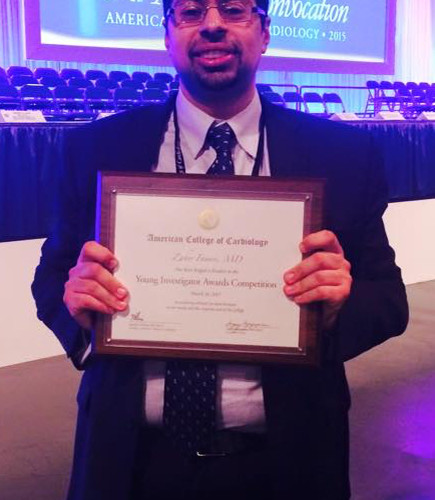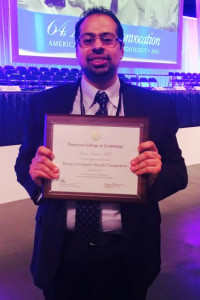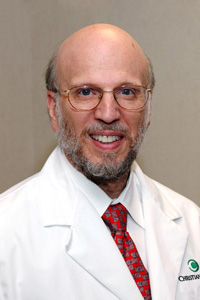Fellowship proves fertile ground for research accomplishments


Zaher Fanari, M.D., who recently graduated from the cardiovascular medicine fellowship at Christiana Care, helped highlight the caliber of the Center for Heart & Vascular Health’s research capabilities on a global scale.
Dr. Fanari was drawn to pursuing answers to questions that no one knew the answer to.
“Christiana Care,” he said, “was a unique and ideal place to pursue those answers.”
During his three-year fellowship, Dr. Fanari’s accomplishments were exceptional:
- Authorship of one book, “Land Mark Clinical Trials in Cardiology.”
- Authorship of six book chapters.
- 24 published peer-reviewed journal articles.
- 7 online peer-reviewed journal articles.
- 28 published peer-reviewed journal abstracts.
- 4 oral presentations.
- 41 poster presentations.
- 46 manuscripts.
It was not just the quantity of Dr. Fanari’s work but the substance.
Most recently, at the 26th Annual American Society of Echocardiography’s (ASE) Scientific Sessions, Dr. Fanari’s research on both severe aortic stenosis and echo lab processes were highlighted. It marked the first time in the history of the ASE annual meeting that the society had highlighted two abstracts from the same author.
Earlier this year, at the American College of Cardiology’s (ACC) global conference, Dr. Fanari was one of only 20 researchers — from thousands of cardiovascular professionals across the globe — recognized with the college’s Young Investigator Award.
The ACC recognized Dr. Fanari due to his research into the effectiveness of the addition of medical intensivists to multidisciplinary teams within the Cardiac Intensive Care Unit. Before the change, patients admitted to the Cardiac Intensive Care Unit were seen by cardiologists, who addressed the issues that prompted admission to the unit — myocardial infarction, cardiogenic shock, arrhythmia, etc. — and then called in medical intensive-care physicians, sometimes up to two days after admission, for consultations regarding subsequent issues, such as renal failure.
After the intensivists had joined the teams and contributed months’ worth of critical insights, Dr. Fanari began researching the impact of the addition of the intensivists to the initial patient care discussions held each time by cardiologists, cardiology fellows, internal medicine residents and interns, ICU nurses, an ICU pharmacist and respiratory therapists. The improvement in outcomes, he said, was shocking.
“We expected a study of the results would confirm this approach would shorten patients’ stays in the unit, but we were pleasantly surprised by how much improvement the change produced,” he said. “In addition to decreased stays, the data indicated patients treated by this expanded multidisciplinary team, rather than primarily cardiologists, saw great reductions in morbidity and even a one-third reduction in mortality as a result. The Cardiac Intensive Care Unit’s outcomes were already above the national average before these changes, but these results set the unit even further above its peers.”
Dr. Fanari’s study highlighted results from July 2011 to July 2013, during which a total of 2,475 patients were admitted to the Cardiac Intensive Care Unit. Medical intensivists were first added to the Cardiac Intensive Care Unit’s multidisciplinary teams in July 2012, by which point 914 patients had been admitted. In reviewing patient cases before the policy change and the 1,561 admissions after the medical intensivist joined the team, Dr. Fanari found that ICU mortality dropped to 3.5 percent from 5.9 percent, hospital mortality decreased to 4.4 percent from 11.1 percent, the length of stay in the hospital was reduced by half a day, and days on a ventilator dropped to 2 from 4.3.
“The collaboration produced significant improvements in overall health and mortality rates,” Dr. Fanari said.
Dr. Fanari trained under the leadership of William S. Weintraub, M.D., John H. Ammon Chair of Cardiology and founding director of the Center for Outcomes Research, Value Institute, and cardiology fellowship directors Sandra Weiss, M.D., and Michael Kostal, M.D.
A highly accomplished researcher in his own right, Dr. Weintraub said Dr. Fanari’s research at Christiana Care will benefit patients throughout the world for decades to come.

“Dr. Fanari has been extraordinarily successful as a researcher,” Dr. Weintraub said. “He has good ideas, writes extraordinarily well and has tremendous follow-through. Above all, he is an original thinker and expertly modeled how junior clinical investigators can work with our analytic scientists.”
Dr. Fanari was valedictorian of his 2007 graduating class at Aleppo University, Faculty of Medicine, in Aleppo, Syria, and came to the United States to combine his passion for research with outstanding clinical training. He joined Christiana Care after an internal medicine residency at St. Louis University and will later serve as an interventional cardiology fellow at the University of Kansas School of Medicine. He now will return to Kansas to begin an interventional cardiology fellowship.
“The reason I came to Christiana Care is because it is a very coordinated and supportive place to work, and throughout my time I received unbelievable support for my work,” Dr. Fanari said. “I am really grateful for the great opportunities and support that I was offered during my three years at Christiana Care.”